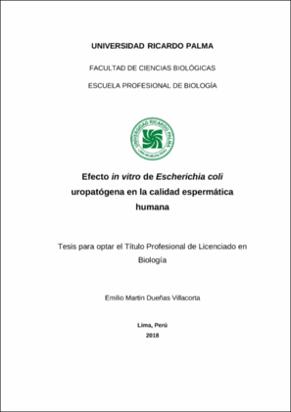“Efecto in vitro de Escherichia coli uropatógena en la calidad espermática humana.“
Abstract
El espermatozoide es una célula altamente especializada encargada de
llevar el material genético paterno hasta el tracto reproductivo femenino en
búsqueda del oocito, sin embargo durante su desplazamiento puede
interactuar con microorganismos que puede transportar desencadenando
procesos infecciosos que alteran el éxito reproductivo. El objetivo de este
estudio fue determinar el efecto in vitro de Escherichia coli uropatógena en
el parámetro de motilidad, vitalidad, aglutinación y el impacto en la
fragmentación de ADN espermático humano. Se evaluaron 40 muestras de
semen provenientes de jóvenes con edades comprendidas entre 20 y 25
años. Se obtuvo la cepa microbiana ATCC E.coli 25922 por medio de
compra marca Microbiologics®, y se evaluó el efecto de E.coli en la calidad
espermática en humano, se incubó 1ml de semen con buffer Flushing
(Origio®) con la cepa de E. coli, se utilizó cuatro concentraciones
diferentes, para obtener una relación de E. coli a espermatozoides de
0,5:9,5 1:9, 3:7, y 5:5. Como resultado se observa que disminuye los
valores de vitalidad (t1) a 77,36% +/-4,50, el segundo tratamiento (t2)
disminuye a 72,93% +/-5,29, el tercer tratamiento (t3) a 67,84% +/-7,16, y
el cuarto tratamiento (t4) a 59,35% +/-5,43.Motilidad (t1) 42,69% +/-27,66,
el segundo tratamiento 37,77% +/-29,51, el tercer tratamiento (t3) 26,27%
+/-35,89 y el cuarto tratamiento (t4) disminuye a 17,79% +/-24,61. Es
evidente que la presencia de la cepa microbiana ATCC E.coli 25922 causa
un efecto patógeno de aglutinación de espermatozoides en todos los
tratamientos (p<0,05) en el primer tratamiento (t1) 60,02% +/-25,96, el
segundo tratamiento (t2) 65,03% +/- 24,15, en el tercer tratamiento (t3)
68,61% +/-22,29 y el cuarto tratamiento (t4) 72,95% +/-21,08, se demuestra
que a medida que aumenta la concentración de E.coli aumenta la
fragmentación de ADN espermático.
The spermatozoon is a highly specialized cell responsible for carrying the
paternal genetic material to the female reproductive tract in search of the
oocyte, however during its displacement it can interact with microorganisms
that can transport triggering infectious processes that alter reproductive
success. The objective of this study was to determine the in vitro effect of
uropathogenic Escherichia coli on the motility, vitality, agglutination
parameter and the impact on fragmentation of human sperm DNA. We
evaluated 40 semen samples from young people aged between 20 and 25
years. The ATCC E.coli 25922 microbial strain was obtained through the
purchase of Microbiologics® brand, and the effect of E. coli on sperm quality
in human was evaluated, 1ml of semen was incubated with Flushing buffer
(Origio®) with the strain of E. coli, four different concentrations were used,
to obtain a ratio of E. coli to spermatozoa of 0.5: 9.5 1: 9, 3: 7, and 5: 5. As
a result it is observed that it diminishes the values of vitality (t1) to 77.36%
+/- 4.50, the second treatment (t2) decreases to 72.93% +/- 5.29, the third
treatment (t3) to 67.84% +/- 7.16, and the fourth treatment (t4) to 59.35%
+/- 5,43.Motility (t1) 42.69% +/- 27.66, the second treatment 37 , 77% +/-
29.51, the third treatment (t3) 26.27% +/- 35.89 and the fourth treatment (t4)
decreases to 17.79% +/- 24.61. It is evident that the presence of the ATCC
E.coli 25922 microbial strain causes a pathogenic effect of sperm
agglutination in all treatments (p <0.05) in the first treatment (t1) 60.02% +/-
25.96, the second treatment (t2) 65.03% +/- 24.15, in the third treatment (t3)
68.61% +/- 22.29 and the fourth treatment (t4) 72.95% +/- 21.08, it is
demonstrated that as the concentration of E. coli increases, the
fragmentation of sperm DNA increases.
Collections
- Biología [176]


